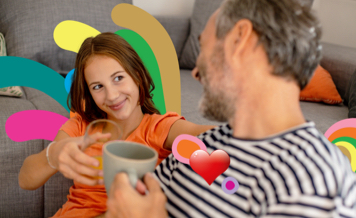Post-traumatic stress disorder (PTSD)
Gain a better understanding of PTSD, including its symptoms, causes, risk factors, potential treatment options, and tips for managing life with PTSD.
Jump to section: PTSD symptoms | Causes | Treatment options | Living with PTSD | Where to get help |
What is PTSD
Post-Traumatic Stress Disorder (PTSD) is a mental health condition that may develop after experiencing or witnessing traumatic events. It can affect anyone, regardless of age, gender, or background. It is usually characterised by intrusive thoughts, nightmares and flashbacks of past traumatic events. In Australia, PTSD affects many people, including specific groups such as military members, emergency workers, and those who have been through natural disasters. About 11% of Australians will experience PTSD at some point in their lives.
PTSD symptoms
For people with PTSD, the feelings of panic or extreme fear experienced during the traumatic event can live on. There are four common types of symptoms:
Re-living the traumatic event: Recurring memories, vivid images and nightmares of the traumatic event. These may prompt intense emotional or physical reactions, such as sweating, heart palpitations or panic.
Feeling overly alert or wound up: This can result in sleeping difficulties, irritability and lack of concentration, being easily startled and constantly on the lookout for signs of danger.
Avoiding reminders of the event: Deliberately avoiding activities, places, people, thoughts or feelings that bring back memories of the event.
Feeling emotionally numb: Losing interest in day-to-day activities, feeling cut off and detached from friends and family, or emotionally flat.
PTSD can also manifest itself as a dissociative experience. People with PTSD may express confusion or say things like “it felt like time stood still” or “I felt like I was watching myself from above”. If someone close to you is experiencing these symptoms, it’s best to recommend that they consult their doctor or mental health professional to undertake a mental health assessment.
If your loved one has PTSD, they may appear disinterested or detached from things they used to be interested in. They might also seem distant and pre-occupied as their brain tries to process and block out painful memories. They may also ignore your offers of help which might make you feel shut out.
It’s not unusual for people with PTSD to experience other mental health issues, such as anxiety and depression, at the same time.

Causes of PTSD
Many different types of trauma have been found to put people at risk of PTSD, or contribute to it:
Prolonged trauma over some time
Past traumas such as sexual or childhood abuse
Mental health issues you may already have (e.g. anxiety and depression)
An occupation that regularly exposes you to trauma (e.g. firefighter, paramedic, police officer or military personnel)
A traumatic event like a natural disaster (for example, a bushfire), being held captive, threatened with a weapon or tortured, war or terrorism, a car accident, or seeing someone injured seriously or dying.
PTSD treatment
Anxiety and stress are common symptoms many people experience after a traumatic event.
A conversation with a GP or health professional may help you process the event and provide pathways to recovery.
If you continue to experience ongoing PTSD symptoms within 3 months after the incident, it’s worth discussing treatment options with a GP or health professional; they will be able to assess your situation and explain the treatments available.
If clinically appropriate, PTSD is often treated with psychological therapies or medicines. Psychological therapies aim to teach you how to process traumatic memories and manage your anxiety. Medicines may be recommended if the symptoms of PTSD are severe. Medicines for PTSD are often used in tandem with psychological therapies.
According to the PTSD Guidelines published by Phoenix Australia, the different type of psychological therapies include:
Trauma-focused cognitive behaviour therapy (TF-CBT) — This involves working through memories of the trauma in a safe and structured environment, trying to change unhelpful beliefs and thoughts and gradual exposure to triggers that make you anxious.
Prolonged exposure (PE) — A type of talking therapy, which involves retelling your trauma memories until they become less distressing.
Cognitive processing therapy (CPT) — A type of CBT, which focuses on people who are stuck in their thoughts about trauma.
Eye movement desensitisation and reprocessing (EMDR) — This involves working through memories of the trauma while going through a series of eye movements.
Medibank is funding a new innovative psychotherapy program for eligible Medibank members with PTSD that aims for clinically significant improvements in PTSD symptoms. Medibank is also funding the Australian National University to conduct research to explore the effectiveness of this program.
Medibank Psychotherapy for PTSD will involve Medibank funding a 16-18 week psychotherapy program for eligible Medibank members. Participation will not be suitable for everyone and clinical approval from your current GP or psychiatrist will be required. The program is currently available in Perth, Mornington, Brisbane, New South Wales and Australian Capital Territory.
Find out more by logging in to My Medibank, or you can call our 24/7 Medibank Mental Health Support line on 1800 644 325 (press option 2). Or you can chat to us online anytime of the day or night.
Living with PTSD
Living with PTSD can be a challenge, but there’s strategies and adjustments you can make that might improve your quality of life. Self-care, lifestyle adjustments, and a strong support system may help you manage PTSD's impact on your daily life and relationships.
Self-care strategies are essential for individuals with PTSD. Relaxation activities, such as mindfulness techniques, deep breathing exercises, or meditation, may help calm the mind and body.
Regular exercise, like walking or yoga, helps to manage anxiety and improve your general wellbeing.
Lifestyle adjustments may help you manage your symptoms of PTSD, such as establishing good routines and a healthy sleep schedule. These habits might help you to regulate emotions and minimise triggers.
Reducing alcohol and substance abuse may also be beneficial because they can worsen symptoms and interfere with treatment.
A safe and supportive home environment can also help to minimise any exposure to things that may trigger the symptoms of PTSD.
A strong social support system is important and may include community resources like support groups or counselling services, which may offer valuable guidance, empathy, and a sense of belonging. Trusted friends and family members can also provide emotional support and a listening ear.
PTSD can impact your personal relationships. Talk openly and honestly with your loved ones about your condition so they can better understand your triggers and symptoms. Educate them about PTSD and the challenges you face.
What can I do if someone I love is struggling with PTSD?
PTSD can negatively impact a person’s relationships with friends and family.
So what should you do? It’s important to remember that these behaviours are part of PTSD. People experiencing PTSD do need the support of their friends and family even if in the first instance they believe they do not need it.
Beyond Blue has some great information and resources to use to support someone close to you with PTSD.

Where to get help
If your life or someone else’s is in danger, call 000 immediately.
If you’re in distress and need help, call Lifeline on 13 11 14 for 24/7 crisis support.
For non-emergency support, your GP or regular health practitioner is often the best place to start. They will be able to assess your individual situation and recommend the best next steps for your recovery.
Remember that help is always available, no matter the situation.
How can we help?
I want to know how my cover supports mental health
I need help and want to talk
Related articles
Things you need to know
While we hope you find this information helpful, please note that it is general in nature. It is not health advice, and is not tailored to meet your individual health needs. You should always consult a trusted health professional before making decisions about your health care. While we have prepared the information carefully, we can’t guarantee that it is accurate, complete or up-to-date. And while we may mention goods or services provided by others, we aren’t specifically endorsing them and can’t accept responsibility for them. For these reasons we are unable to accept responsibility for any loss that may be sustained from acting on this information (subject to applicable consumer guarantees).





